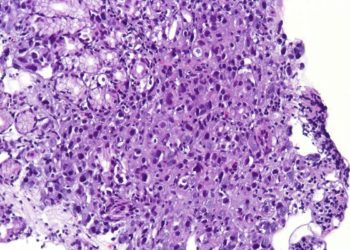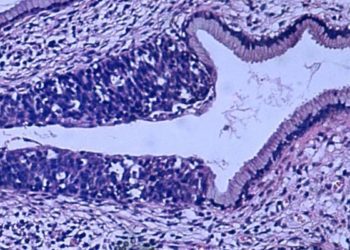Adjuvant atezolizumab shows benefit in patients with stage II-IIIA non-small-cell lung cancer
1. Atezolizumab showed a benefit for disease-free survival in patients with stage II-IIIA NSCLC compared to best supportive treatment.
2. Grade 3 or 4 adverse events occurred in 22% of atezolizumab patients and in 12% of patients on the supportive care control group.
Evidence Rating Level: 1 (Excellent)
Study Rundown: Non-small-cell lung cancer (NSCLC) has a 36% 5-year survival rate in locally advanced (stage III) disease, even after complete surgical resection. The PD-L1 inhibitor, atezolizumab, has shown promise as an adjuvant therapy following cisplatin-based chemotherapy. However, data on the long-term outcomes remains limited. In this phase 3 study, atezolizumab was evaluated against standard supportive treatment following chemotherapy. 1005 patients with resected stage IB-IIIA NSCLC were randomized into either intravenous atezolizumab every 21 days for up to 1 year or best supportive care of regular scans and observation. The primary endpoint was disease-free survival, and the mean follow-up period was 32.2 months. 3-year disease free survival was significantly improved in the atezolizumab group compared to the control group for patients with stage II-IIIa disease and PD-L1 expression in ≥1% of cells. Serious adverse events occurred in 18% of atezolizumab patients compared to 8% of those on supportive care. Limitations of this study included open-label design. Nevertheless, this study showed a potential therapy for stage II-IIIA NSCLC in patients with PD-L1 expression.
Click to read the study in the Lancet
Click to read an accompanying editorial in the Lancet
Relevant Reading: Atezolizumab for First-Line Treatment of PD-L1–Selected Patients with NSCLC
In-Depth [randomized controlled trial]: Impower010 is an international, multi-center study in 22 countries evaluating adjuvant atezolizumab versus supportive treatment. Adult patients (≥18 years) were recruited if they had completely resected stage IB-IIIA NSCLC and cisplatin-based chemotherapy. 1005 patients were randomized 1:1 and stratified by sex, tumor histology, disease stage and PD-L1 expression. The treatment group received 1200 mg atezolizumab IV on day 1 of each 21-day cycle for up to 1 year (or 16 cycles) and the control group received best supportive care (observation, regular scans). The primary outcome was disease-free survival and median follow-up was 32.2 months. 3-year disease-free survival was 60% in the atezolizumab group and 48% in the supportive care group in patients with stage II-IIIA with PD-L1 expression in >1% of cells (Hazard ratio = 0.66 [95% CI 0.50-0.88, p=0.0039]). In the intention-to-treat population, the 3-year disease-free survival was 58% survival in atezolizumab and 53% in supportive treatment (p=0.040). Adverse events (grade 3 and 4) occurred in 22% of atezolizumab and 12% of supportive care.
Image: PD
©2021 2 Minute Medicine, Inc. All rights reserved. No works may be reproduced without expressed written consent from 2 Minute Medicine, Inc. Inquire about licensing here. No article should be construed as medical advice and is not intended as such by the authors or by 2 Minute Medicine, Inc.







